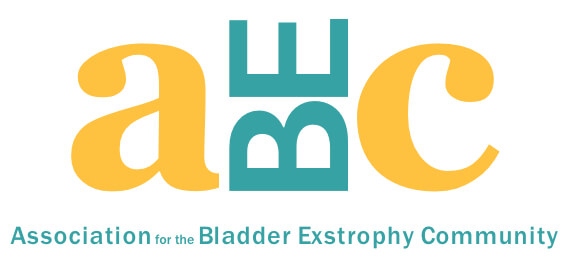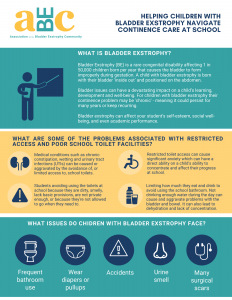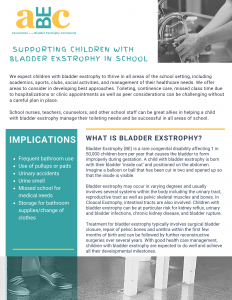School Bathroom Toolkit
We expect children with bladder exstrophy to thrive in all areas of the school setting, including academics, sports, clubs, social activities, and management of their healthcare needs. We offer areas to consider in developing best approaches. Toileting, continence care, missed class time due to hospitalizations or clinic appointments as well as peer considerations can be challenging without a careful plan in place.
School nurses, teachers, counselors, and other school staff can be great allies in helping your child with bladder exstrophy manage their toileting needs and be successful in all areas of school. Still, you will need to help them understand what they should know when teaching or working with a child with bladder exstrophy. It will be helpful for you to share the basics with your child’s school team, but do talk with your child, first, to clarify how they feel about sharing personal medical history.
A-BE-C has put together these resources to help you and your student successfully communicate with your school administrators and teachers to implement healthy and necessary procedures.
Our at-a-glance fact sheet can be used as a reference guide when setting up 504 plans or making other accommodation plans with your child’s teacher.
Older students may find this tool useful to share with professors or other administrators to start a conversation about their unique bathroom requirements.
This bladder exstrophy informational sheet is a great resource to share with teachers, administrators, or even other parents who are curious about bladder exstrophy.
This can serve as a great learning tool to share and start a conversation.
Additional Resources
These letters can be customized by you and/or your child’s physician and given to the school. We are always adding resources, so check back often for updates! Have a resource you’d like to share? Send us an email!
Physician Order for Schools Regarding Intermittent Catheterization
Many schools are unequipped to handle the needs of a child who needs assistance with catheterization.
Having a physician order can sometimes help you stress the importance of your child’s bathroom needs with their school.
Sample Letter from Parents to School to Initiate a 504 Plan
Starting a 504 plan can seem overwhelming, and a lot of parents talk themselves out of initiating one because they think it is seen as unnecessary. We think a 504 is essential in many cases to ensure the student is allowed appropriate bathroom access, accommodations for longer trips to the bathroom, and access to water throughout the day.
Sample 504 plans coming soon.
Sample Letter from Doctor to School Regarding Incontinence
Your doctor can send a letter to your child’s school to help explain the reason for your child’s incontinence, and instruct the school on ways to ensure your child’s bathroom needs are being met. Involving your child’s physician can sometimes stress the importance of healthy toileting for bladder exstrophy individuals.
Sample Letter from Doctor to School Regarding Catheterization
Children who use a catheter require additional intervention, and having a letter from their doctor can help stress the importance of their needs. School staff are sometimes unaware of the extra time needed in the bathroom, as well as the need for privacy and discretion.
NEW! Printable Bathroom Passes
Teachers, substitutes and other school staff may need reminders that your child has been granted unlimited bathroom access. These discreet cards are now available for download so you can print at home! Always make sure to work with your school administrative team so everyone is informed and on the same page.
Coming Soon!
A-BE-C has created a prototype for bladder exstrophy underwear. We are waiting on a final sample and will hopefully begin production very soon!
Making Bathroom Policies a Priority
Dr. Elizabeth R. Mueller, Loyola University Chicago Stritch School of Medicine, discusses research findings that suggest a lack of bladder health education in school systems, which can negatively impact the health of school-aged children.
Pamela Artigas, Executive Director of A-BE-C, follows with a presentation on ways to help children with exstrophy navigate continence care at school.
About the Presenters
 Elizabeth R. Mueller, MD, MSME
Elizabeth R. Mueller, MD, MSME
Loyola University Stritch School of Medicine, Professor, Division and Fellowship Director Female Pelvic Medicine and Reconstructive Surgery
Dr. Elizabeth R. Mueller MD, MSME, is a Professor of Urology and Obstetrics/Gynecology at Loyola University Chicago Stritch School of Medicine. She is also Division and Fellowship Director of Female Pelvic Medicine and Reconstructive Surgery Program. She was a registered nurse and later completed a BS in Mechanical Engineering at the University of Missouri-Rolla and a MS in Mechanical Engineering at Washington University in St. Louis. She practiced as an engineer and business manager with Procter and Gamble for 6 years before attending St. Louis University’s School of Medicine. She completed her urology residency and FPMRS fellowship at Loyola University. She is board-certified in both.
Dr. Mueller is an NIH-funded researcher with an interest in minimally invasive (laparoscopic and vaginal) approaches to pelvic organ prolapse. She is a principle investigator and member of the NIDDK funded consortium on the Prevention of Lower Urinary Symptoms (PLUS) in women. Other areas of research interest include using 3-D ultrasound of the pelvic floor for pelvic floor disorders and management of surgical complications, understanding the urinary microbiome and its relationship to lower urinary tract symptoms. She is a gifted educator and has received numerous awards including Loyola University Stritch School of Medicine’s “Attending of the Year”, the Society of Women in Urology Christina Manthos Mentoring Award and the American Urogynecological Society Raymond Lee Lecture Award given to one person annually who contributed to the development and surgical advancement of urogynecology. In 2019, she was awarded a American Urological Association Presidential Citation for contributions in founding the field of Female Pelvic Medicine and Reconstructive Surgery and substantial research in this area. She is also the mother to incredible 16-year old twins, Jonathan and Mia Rose.
 Pamela Artigas
Pamela Artigas
Executive Director – Association for the Bladder Exstrophy Community
Pamela Artigas is a mother by choice of a child with bladder exstrophy. Pamela has a passion for and an understanding of this rare medical condition. In 2009, Pamela adopted her then 4-year-old daughter from China who was born with bladder exstrophy. Since bringing her daughter home, Pamela has dealt with the many hurdles of raising a child with exstrophy including her daughter’s complete primary repair after a late and failed initial closure while in a Chinese orphanage.
Since then, Pamela has made it her life’s mission to develop a global support network with medical credibility. As President and Executive Director of A-BE-C, Pamela’s leadership goals are to forge partnerships with patients, their families, and the medical community to enhance the care and clinical outcomes, provide value and improve the quality of life for children born with this condition. A-BE-C provides often hopeless parents around the world with the information, guidance and resources they need to seek treatment.
Pamela brings to A-BE-C over twenty years of business and nonprofit experience, including significant roles in management, program and organizational development, strategic and business planning and business development. She has been actively involved as a volunteer on a global level, most notably for her ongoing fundraising and advocacy efforts on behalf of children from underserved countries living with bladder exstrophy. Pamela attended the University of Tennessee as a business major and received her Certificate in Nonprofit Management from Duke University.







